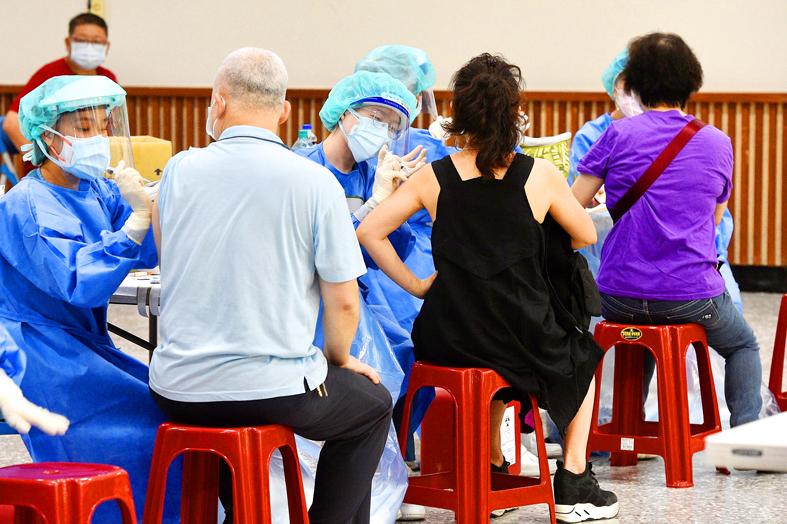Inoculation of government officials with a second dose of COVID-19 vaccine should be postponed to allow more people to get their first shot, Taiwan People’s Party Legislator Tsai Pi-ru (蔡壁如) wrote on Facebook yesterday.
Taiwan has thus far received 8.9 million vaccine doses, but it is a long way until all its 23 million residents are inoculated, she said.
It is crucial to allow every Taiwanese to get their first shot, she said, adding that the second doses for government officials in the second vaccine priority group should be postponed.

Photo: George Tsorng, Taipei Times
Tsai has worked as a nurse at National Taiwan University Hospital’s intensive care unit. Taipei Mayor Ko Wen-je (柯文哲) worked as surgeon at the same hospital before he assumed office in 2014.
The Central Epidemic Command Center (CECC) gives “important government officials necessary for maintaining disease prevention work” second-highest COVID-19 vaccine priority.
The second priority group includes 160,000 people, of whom more than 10,000 work for central government agencies, including the Presidential Office, National Security Council, Executive Yuan and subordinate agencies, as well as the CECC, Tsai said.
Central government officials who are not deployed in hospitals or pandemic hot spots, and do not deal with COVID-19 patients, should not get their second dose before frontline healthcare workers, she said, adding that the CECC should reserve the Moderna COVID-19 vaccine for them.
The AstraZeneca COVID-19 vaccine should be reserved for priority group members who have not received their first dose, she said.
The government should work toward inoculating the largest number of people possible, including foreign residents, with the AstraZeneca jab.
In general, the second dose should be given 12 weeks after the first, but frontline healthcare workers should receive the second dose as early as permitted by the vaccine’s respective guidelines, she said.
No individual is safe until every resident is vaccinated, she said.
Tsai also echoed Ko’s argument that people should be allowed to receive two doses of different vaccine brands, saying that Taiwan’s vaccine supply is unstable.
The University of Oxford has studied inoculations with different vaccine brands, she said, adding that it has completed a study on the combination of the AstraZeneca and the BioNTech vaccines.
The university is working on a study on the combination of the AstraZeneca and the Moderna vaccines, she said.
Some countries, including Germany and Iceland, have approved second-dose vaccinations with the BioNTech or Moderna jabs, following the AstraZeneca vaccine, she said, adding that Taiwan should follow that example.

Eight restaurants in Taiwan yesterday secured a one-star rating from the Michelin Guide Taiwan for the first time, while three one-star restaurants from last year’s edition were promoted to two stars. Forty-three restaurants were awarded one star this year, including 34 in Taipei, five in Taichung and four in Kaohsiung. Hosu (好嶼), Chuan Ya (川雅), Sushi Kajin (鮨嘉仁), aMaze (心宴), La Vie by Thomas Buhner, Yuan Yi (元一) and Frassi in Taipei and Front House (方蒔) in Kaohsiung received a one-star rating for the first time. Hosu is known for innovative Taiwanese dishes, while Chuan Ya serves Sichuan cuisine and aMaze specializes

STATS: Taiwan’s average life expectancy of 80.77 years was lower than that of Japan, Singapore and South Korea, but higher than in China, Malaysia and Indonesia Taiwan’s average life expectancy last year increased to 80.77 years, but was still not back to its pre-COVID-19 pandemic peak of 81.32 years in 2020, the Ministry of the Interior said yesterday. The average life expectancy last year increased the 0.54 years from 2023, the ministry said in a statement. For men and women, the average life expectancy last year was 77.42 years and 84.30 years respectively, up 0.48 years and 0.56 years from the previous year. Taiwan’s average life expectancy peaked at 81.32 years in 2020, as the nation was relatively unaffected by the pandemic that year. The metric

Taiwan High Speed Rail Corp. (THSRC) plans to ease strained capacity during peak hours by introducing new fare rules restricting passengers traveling without reserved seats in 2026, company Chairman Shih Che (史哲) said Wednesday. THSRC needs to tackle its capacity issue because there have been several occasions where passengers holding tickets with reserved seats did not make it onto their train in stations packed with individuals traveling without a reserved seat, Shih told reporters in a joint interview in Taipei. Non-reserved seats allow travelers maximum flexibility, but it has led to issues relating to quality of service and safety concerns, especially during

A magnitude 5.1 earthquake struck Chiayi County at 4:37pm today, the Central Weather Administration (CWA) said. The hypocenter was 36.3km southeast of Chiayi County Hall at a depth of 10.4km, CWA data showed. There were no immediate reports of damage resulting from the quake. The intensity of the quake, which gauges the actual effect of a seismic event, measured 4 in Chiayi County, Tainan and Kaohsiung on Taiwan's seven-tier intensity scale, the data showed. The quake had an intensity of 3 in Chiayi City and Yunlin County, while it was measured as 2 in Pingtung, Taitung, Hualien, Changhua, Nantou and Penghu counties, the data